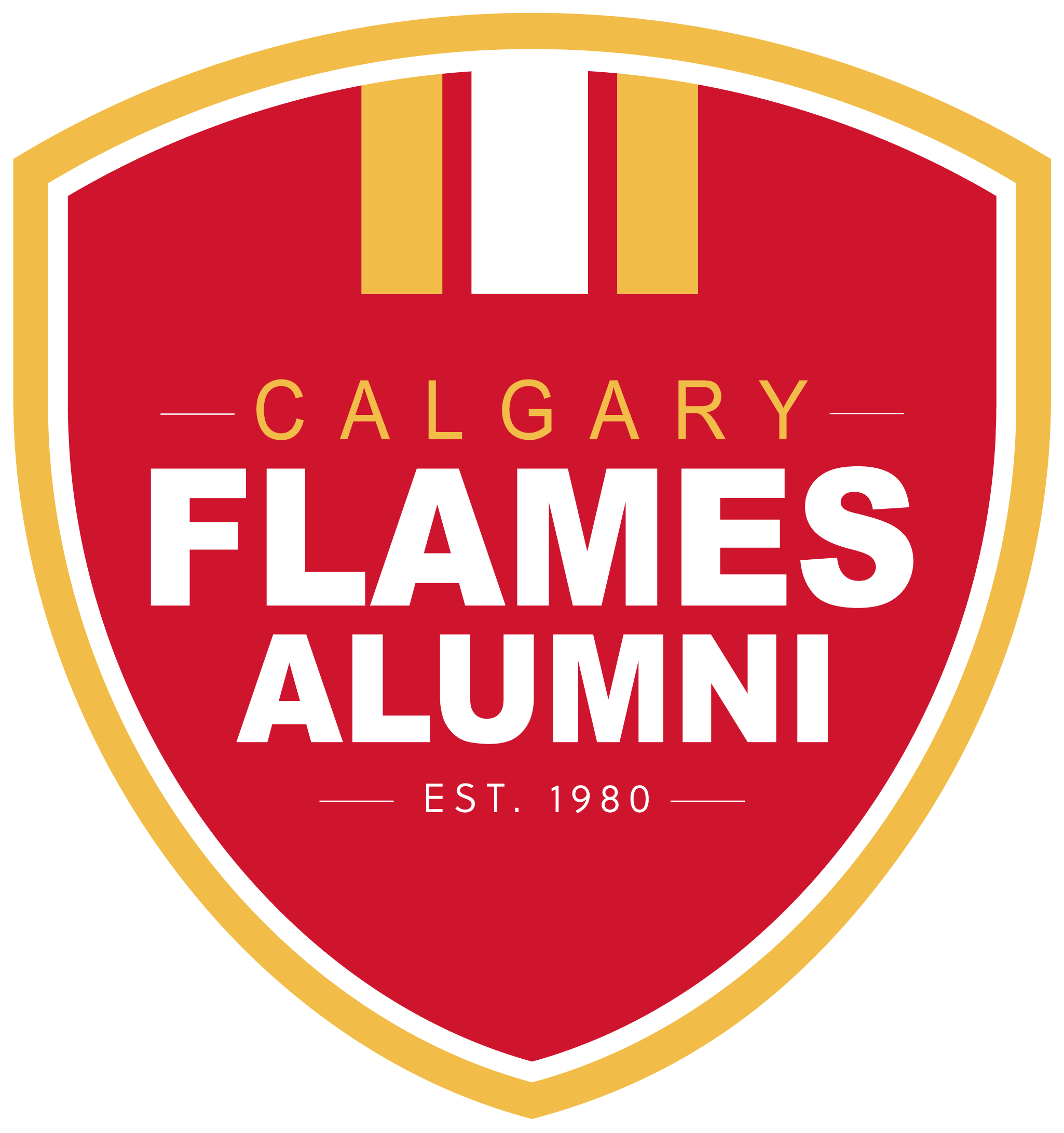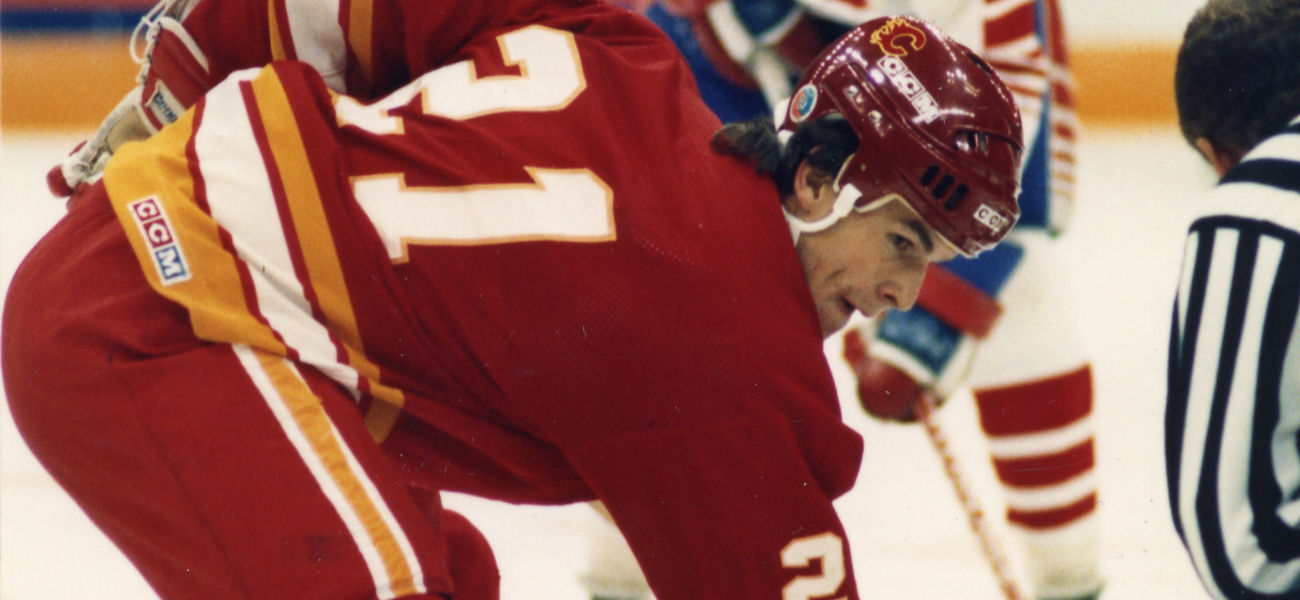Slumped inside the invading dressing room at floor level of the Olympic Saddledome on that Feb. 10th evening, 1993, one knee in tatters and the San Jose Sharks in the midst of a 13-1 ass-whuppin’ from his old franchise, Perry Berezan knew.
Knew it as a fact as sure as his own name, the name of his wife and his date of birth.
Just knew.
“First period, I think it was, Sternie (Ron Stern) hit me knee on knee and I was helped off the ice, limped into the room knowing I’d torn my MCL,” the immensely likeable former Flame is recalling.
“I’m alone in there.
“And all of a sudden I hear: ‘Kid? Kid?’ It’s Eddie Whalen, peeking into the room. ‘How the hell ya doin’, Kid? You OK?’
“Just he and I.
“I looked at him, I felt so tired, and I said: ‘Ed, I can’t do this anymore. I’m done.’
“I actually said that out loud, to Ed Whalen.”
And sure enough, that summer Berezan called ‘er a career, after nine seasons and 378 regular-season appearances, having been credited with that goal – the Steve Smith own goal – that slayed the Edmonton Oilers in ’86.
But such a tie is never severed easily, and for confirmation he phoned Doug Risebrough, still here in Calgary working as GM and a couple of former teammates by then in club management, to get an accurate, unfiltered barometer to his status within the league.
“I asked them, point blank: ‘Honest opinion: Where does Perry Berezan fit in the NHL?’
“I was 29. At 29, people know who you are. It’s not like: ‘Who is this guy? Never heard of this guy.’ And they all were honest with me, said I’d have to go through the tryout thing, proving myself, again. I remember Riser telling me: ‘Potential is something you don’t have anymore.’
“Sounds harsh, but those were good, sobering words to hear.
“Looking back, the whole year hadn’t been fun. I’d been mentally checking out anyway. That year, in training camp, we had our first child and Marie was diagnosed with MS. So I’m going on road trips and she’s at home dealing with a baby and with a disease she’s been told she’s got.
“But when I heard that from Riser – what I needed to hear – in the summer … I already knew by then I was just hanging on. I thought: ‘What’s the point?'”
So with two years remaining to finish his business degree, Berezan phoned the University of North Dakota to re-enroll. He hooked up with his Fighting Sioux coach, the legendary Gino Gasparini, and did a stint of in-town assistant coaching at practice and radio color commentary for home games while attending classes.
Today, home ice for Berezan is Suite 200, 8th Ave., SW, the Berezan Sherven Group, financial planners for National Bank Financial Group.
Occupying the adjoining office is Gord Sherven, a pal from his UND days, part of the Canadian National Team at the 1988 Winter Olympics in Calgary, NHLer in Edmonton, Minnesota and Hartford and a 13-year warrior of the European leagues.
“We started working in the same office in September of 2000,” notes Sherven. “In six weeks, we’ll have been partners for 20 years.
“We’d gone to North Dakota together, I’d lived with him and Joel Otto while I was on the national team. We’re just really close friends.
“I go to work every day knowing he’s right next to me. Perry’s one of the most positive people I’ve met, anywhere. I don’t care if you’re in oil and gas, you’re a doctor, you’re a lawyer, an accountant, hockey coach … there’s always pressure, there are always tough days.
“I’m just lucky I can go right next door, a few steps, and bounce ideas off him. We must go into each other’s office four, five, six times a day.”
Berezan obviously relishes the give and take, too.
“In this business, there’s massive satisfaction in being able to help people. Because Gord has the office next door, when that happens, he can come and share it with me. It’s like a win. A goal. We shared the same type of thing in hockey.
“There are two types of guys in the National Hockey League. One is constantly thinking about what to do outside of the game, to prepare for the inevitable. And the other is 100% all in, 24/7, thinking hockey, hockey, hockey. All the time.
“At the end of the day, I’m not sure which one is better.
“I do know if I’d been 100% hockey, basically given my life to the game, I’d have had a better career. If you’re willing to sacrifice, to do anything …
“And it’s obvious, looking back, that I wasn’t.
“When I played, I was often talking to guys in the business world, asking them questions, but I was also clinging to a career every year, trying to make it last as long as possible.
“So for me, there was a mix. A little of both.”
The idea to take the direction he eventually did arrived when a Sharks’ hockey fan working in advisory investment, someone who Berezan recognized from local charity events, invited him to his office to discuss the trade.
That planted the seed.
Then, after graduating from university, a former teammate in San Jose, Doug Wilson, at the time working for the NHLPA, contacted Berezan about attending a pilot project in career transition.
“I thought ‘The timing could not be better.’ I was already thinking about going down this (financial planning) road. They flew us into Philadelphia for a weekend and they wanted our wives to be a part of it, which was another important part.
“We both went through a variety of tests, 11 of them. Then they took the results and gave us a summary. So we sat with the transition specialist.
“You learn more about each other because I’m sure you’ve heard the divorce rate doubles through the first five years after players retire. I thank Doug a ton.
“It was a shot in the arm – They confirmed what I’d hoped – that I was headed down the right path. I needed that at that time.”
Sherven’s path was somewhat different from his friend and co-worker’s.
“I had the opportunity to leave school early and sign an NHL contract with Edmonton,” he reminisces. “I always thought I’d go back and finish my degree, then teach. I have three brothers who taught, are now retired. So that was the direction I’d planned to go.
“Next thing you know, you’re playing hockey until you’re 37 years old. I’m over in Europe for 13 years, having three young kids and planning my future.”
An opportunity arose to remain at league level in Germany following retirement. Not so much in coaching or management, but Sherven had been very active in developing a players association in the DEL and spoke the language well.
“Our families are in Canada so we always thought about coming home.
“I’d met an individual when I played in Zurich and the team was sponsored by a credit bank. And he said: ‘Come in and let’s talk about the business.’ After we’d spoken, I thought: ‘Yeah, this is something I could do, work in wealth management.’ That tweaked my interest.”
Starting the required Canadian Securities courses while still in Rosenheim and supporting a young family, he’d dig into assignments online while riding the buses.
“I don’t care who you are, the transition out of hockey is never easy,” insists Sherven. “But for me it’s been made smoother by the great alumni here.
“I’m involved with both the Flames and Team Canada alumni. We have that fraternity. So it’s not like you left the game. It’s still right there for you. We go for coffee. I’m a little old to be skating with some of these younger guys but that part is great, too. You still feel part of the locker room.”
What he misses, what they all come to miss to differing degrees, is the immediacy, that electric current of success/failure emotion, only the game can provide.
“I love the dealing with clients, the trust of clients,” says Sherven. “But I’m not as competitive in business as I was in hockey. I have a good lifestyle, good clients. I enjoy going to work.
“But I’m not going crazy, working 10-12 hours a day. There’s got to be a balance. I skate with the alumni and it’s a lot of fun.
“But I do miss that competitiveness you experienced in the game at that high, high level.
“I play tennis pretty regularly now so I also know that it’s still there. I’m a pretty competitive tennis player.”
A la, say, Rafael Nadal?
“The only thing I have in common with Nadal,” he parries, caressing the line with a snappy cross-court winner of a reply, “is that we’re both left-handed.”

